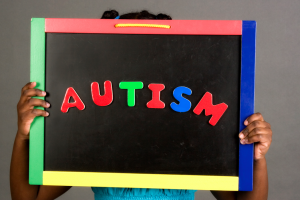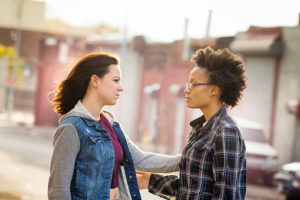Originally published on Bullshitist and republished here with the author’s permission.

A student sits at an outdoor table with books stacked beside them, looking contemplative.
(CN: description of animal death)
My mother has always had a big dog as her companion. Pure bred, large, and obedient. Currently, it’s a standard poodle, before that a Bouvier, and a German Shepherd. When I was growing up, there was a Norwegian Elkhound, a Samoyed, and an Old English Sheepdog.
One might say she loves dogs. I think she’d say so, too. It may be more accurate to say she loves having a dog – and I’m not sure the two are the same thing.
When I was about twelve, a Doberman darted out in front of our car. We weren’t far from our home and moving slowly, single-file in traffic. We both shrieked when the car struck the dog, and I carry a visceral memory of the back wheels lifting, bones cracking as we drove over the dog’s ribcage. My mother began sobbing and repeating a shrill, “My god. My god. My god.”
The dog must’ve just come off the leash or out of a yard because the owner was there in an instant, at the window of our car, looking to care for the dying dog. I don’t know if he blamed her or not.
When I started to roll down the window, my mother screamed for me to leave it up. I was stunned that her horror about the dog turned so quickly to anger at me.
See, I thought we were going to stop the car and attend to what had happened. We didn’t. She drove on, muttering, “I can’t. I can’t. I can’t. I can’t.” And then the rest of the day, I heard her tell the story of the horrible thing that happened to her that morning, in running over the dog.
Schooled as I was in hysterical outbursts, my initial response was to twist my body around to look at the people hovering over the dying dog. I shrieked, “You have to stop! It’s not right! We have to go back! We have to.” But as usual, her denial won the day, and she was the one driving. I soon fell silent as she sobbed, “I can’t. I just can’t.”
Not quite fifteen years later, when her German Shepard was ill, she handed the leash off to my husband to handle her dog being euthanized, again muttering, “I can’t. I just can’t.”
I can think of other, minor incidents of passing off tasks that simply didn’t seem ladylike to accomplish. That’s what I thought at the time. There were things that, with a man around, she simply shouldn’t have to do.
She may enjoy having a dog, but there’s a peculiar lack of evidence that she feels something as deep, complex, and abiding as love.
***
I had already given thought to “trigger warnings” when University of Chicago declared them unsupportable on campus in August 2016.
I’ve never used this term in my syllabi and don’t when I teach. And yet, for many of us explicitly feminist educators, social scientists, and humanities professors who handle the stuff of life – namely the contours of privilege and oppression in everyday life – we are aware that people have been hurt. They will be triggered by our themes of study.
Students deserve our respect and gentleness. I tell them specifically that we will be discussing difficult themes when I teach courses such as Body and Identity or Race and Inequality or Marriage and the Family. I tell them that they should look after themselves and offer some suggestions on how to do that, though certainly non-prescriptively.
Most importantly, I tell them that I’ll do my level best to create an environment that allows for respectful disagreement, exploration of difficult topics, and still, I won’t allow any groups or individuals to be belittled – even those whom we think are not in the room with us. I also tell them that I can make mistakes too, and need to be questioned on occasion.
I revisit these messages as often as needed as we navigate material which is at turns difficult, enlightening, entertaining, fascinating, and challenging. I do it in order to keep people in the conversation, not to give them an easy escape route.
Let’s be careful with language. I want everyone to know the escape route is on topics they simply can’t handle any more on a certain day or in a certain way.
Sometimes, when images are involved in our study of violence for instance, I give alternate assignments. I want to build an environment that makes it easier to stay in the room when things are difficult. That’s the part over which I have some control: the culture and environment of learning.
My explicit aim is to enact a pedagogy of love in which transformation is always an option – for the students, for me, and if we continue our studies and active creation of culture, for the society itself.
Love requires presence. It’s deep and complex and not always capable.
When I have a student who wants to opt out of discussing a certain topic, or is simply absent in a way that makes motive unclear, that student retains my respect. And if the student returns to engage about the grade – that tangible communication with which I judge mastery of the topic – then I want to know clearly how the themes of the course have been addressed.
Much as my mother turned to me with anger when I challenged her decision not to attend to the act of running over the dog, it’s easy for professors to turn quickly to students as the source of irritation when we are questioned.
It’s easy because, often, they’re the ones revealing a problem, suggesting that something in our approach be slowed or diverted.
Professors, due to institutional and personal constraints, often feel seriously challenged when asked to slow down or reroute.
Sometimes, I find student desire to opt-out problematic. I have had students claim they shouldn’t have to read a book that contains “so much” profanity, for instance. I’ve had students claim they shouldn’t have to discuss queer families because it’s wrong and goes against their religion.
Students. Plural.
On both of these topics, female students have claimed that these kinds of assignments should be optional.
I’ve also had male students simply check out of discussions and assignments dealing with pornography and rape. I’ve had white students check out in discussions dealing with racism.
In these latter cases, the disconnect happens without verbal pre-planning, but if I inquire about the check out, I hear that those topics are just “too much.” I see heads shaking and – do I imagine it? – eye rolling.
See, it’s possible to want very much to be in school and yet not to have a love of learning. As with my mother’s relationship with dogs, it’s possible that “I can’t” can really mean, “I shouldn’t have to.”
For some students, the trigger warning is a way to stay in the discussion, to know what’s coming, to look after oneself. For others, it means, “Phew, I don’t have to talk about this, because it’s uncomfortable.”
Why do professors and policies like the one at University of Chicago seem to focus more on this latter interpretation? In my experience, it is the more rare. Literally every student who stays in the conversation benefits from a classroom environment that honors their discomfort and helps them plan ahead.
In her article “Against Students,” Sara Ahmed cautions us to pay attention to the broad sweeping statements made against students who seem “oversensitive.” I agree wholeheartedly with her that “Oversensitive can be translated as: Sensitive to that which is not over.”
She says:
“The idea that students have become a problem because they are too sensitive relates to a wider public discourse that describes offendability as a form of moral weakness and as a restriction on ‘our’ freedom of speech. Much contemporary racism works by positioning the others as too easily offendable, which is how some come to assert their right to occupy space by being offensive.”
The difficult truth is that not all professors are setting up a culture of respect and environments of study that are conducive to deep and respectful learning. Neither do the systems within universities support those kind of classrooms and the institutions themselves often seem more interested in profit and prestige than anything else.
Do some get it right? Absolutely, right down to the administration that supports learning. (Note, I didn’t say “up.”)
There are instructive (and often predictable) patterns in who feels they shouldn’t have to discuss certain topics, just as there are patterns in the types of folks that hold systems accountable to respectful practices. We have to make time and sometimes challenge ourselves to attend to those patterns.
We also have to navigate a good amount of ambiguity as both creators and responders in learning environments.
Sometimes when systems are damaged – when professor pay is inadequate, when sexual harassment is the protected standard, as two examples – it can feel like we’re repairing the ship as we steer through a storm.
Guiding people’s learning about difficult topics is a challenging job under great circumstances. There are no simple fixes here. We need presence, accountability, and respect. Sometimes we need patience, sometimes urgency.
To add complexity, it’s definitely possible for professors to be committed to feminist education or anti-racism education and still not have all of the tools and relationships sorted out in such a way that students seeming “overly sensitive” doesn’t seem like a bad thing.
We should always see these moments as instructive – as events worthy of contemplation and action. Similarly, the responses we receive from students regarding “trigger warnings” can teach us something.
There are also patterns in faculty responses to student requests for sensitivity. These responses require a more immediate intervention.
Under no circumstances should accusations of sexual harassment, racism, and the like be recoded as student sensitivity. When we see or hear about that recoding and tolerate it, then we’re letting down our responsibility as educators.
Sensitivity is good. Even if we don’t know what to say or do immediately, it’s wise to:
1) continue pondering situations that don’t “feel” right without labeling them too quickly,
2) find trusted colleagues (preferably across institutions) with whom to discuss situations for perspective, and
3) reject any interpretation that seems to valorize how things were done in a previous time period without being clear about what happened and who benefited from those circumstances.
Dear student, how will you attend to what needs attending in the subject matter, even if you can’t attend class on a certain day, or you can’t do a certain assignment?
This is my question. I ask the same of myself, my colleagues, and of the institutions in which I am implicated, whose work I perpetuate.
I remind myself that I am capable of applying what I’ve learned and that I am not beholden to institutions; we are co-creating our relationship.
I’m not a traumatized child screaming in the car about injustice and the failure of love, as when my mother ran over that dog. I understand something about power imbalances and accountability. And I’m capable of learning more. Scholars like Ahmed help me, and hopefully, we both help others.
I’ve witnessed and sometimes suffered from my mother’s failings. I’ve also experienced love and nurturing from her. The systems in which we work, as teachers, can both nurture and abuse us as well. It’s a complex relationship.
Of course, we do well to remember that we are not children at the whim of adults whom we must please or risk destruction. It’s not enough to shut the office door and look after ourselves when things get too hard. That’s just surviving.
And although we “shouldn’t have to” engage deeply with the flaws of our institutions, it is part of the work we’ve taken on to do.
[do_widget id=’text-101′]
Kimberly Dark is a writer, sociologist, and raconteur working to reveal the hidden architecture of everyday life, one clever story, poem, and essay at a time. She also leads retreats on yoga and body-stories. Read more at www.kimberlydark.com. Follow on Medium and Twitter: @kimberlydark.
Search our 3000+ articles!
Read our articles about:
Our online racial justice training
Used by hundreds of universities, non-profits, and businesses.
Click to learn more




















